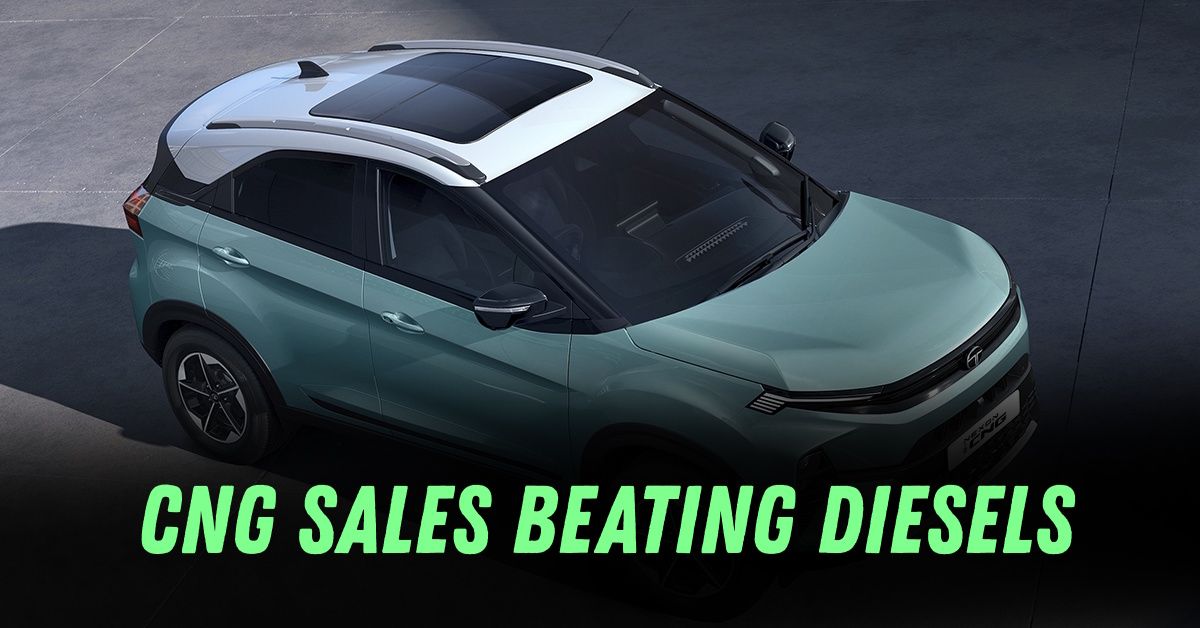It's Official, CNG Cars Are Outselling Diesels In India: We Explain Why


The Indian automotive landscape is witnessing rapid evolution. CNG cars have lately been gaining ground here. In April this year, CNG sales had surpassed those of diesel cars for the first time. Now, we have the fuel-wise yearly sales numbers. It shows that CNG cars outsold diesel ones in the financial year 2025!
As seen on AutoPunditz, 8,38,546 CNG cars were sold in FY25. Diesel car sales, on the other hand, stood at 7,77,303- lower by 61,243 units. Diesel-powered vehicles formed 18 per cent of the total cars sold, while CNGs stood at 19.4 per cent- a clear upper hand. Interestingly, April numbers indicated a CNG penetration of 16.2 %.
The yearly numbers show a major shift in consumer preferences. People now find CNG more desirable than diesel. The CNG space is relatively less crowded. Maruti Suzuki and Tata Motors are the two strong players, followed by Hyundai and Toyota.
Maruti Suzuki sold 5,91,730 CNG vehicles in FY25 and ranks at the top. Tata Motors stands second, having posted sales of 1,39,460 units. Hyundai sold 79,267 units while Toyota recorded sales of 28,089 units.
If you take a closer look, the segment leaders have CNG-powered models in the mass-market segments with high footfalls. In many cases, these double as the better alternative for diesels. A cost and mileage-conscious buyer who is probably searching for a frugal yet affordable diesel vehicle could end up buying one of these as the best possible alternative. CNG is particularly popular in the entry and mid-level segments. Let's take a deep dive...
To start with, India is a cost-conscious market. A large share of the population here wishes to curb the operating costs of their vehicles. They want something that runs more kilometers for a litre of fuel, costs less to maintain, and a fuel that doesn't cost much. Diesel ticked atleast some of these boxes, and this was one good reason for its acceptance.
A large part of the decline in diesel car sales off late can be attributed to the evolving policy environment. The fear of a possible ban on diesel vehicles is pulling many back from buying diesel cars. Regions like Delhi NCR have already announced such bans.
For a customer who is confused about this, the CNG makes for a perfect pitch! It delivers good fuel efficiency, is relatively greener and could thus stay clear of governmental policies, and is cheap to procure. Many states are, in fact, promoting CNG adoption.
CNG adoption could be the highest in the commercial segments. The retirement of diesel engines by Maruti Suzuki had left a void in the fleet segment. Petrol engine would not suffice in making the business profitable, especially for small or individual operators. However, with the excellent fuel efficiency offered by CNG versions, they could minimize operational costs. Many drivers report that CNG versions of the Dzire and Ertiga are more cos-efficient than what their diesels used to be.
Another major factor that has led to the boom is the CNG infrastructure and availability. A lot of CNG dispensers and filling stations are now being set up at various locations. Plus, CNG production and processing have also been ramped up across India. Thus, procuring the fuel is no longer difficult- almost all Indian cities have it!
The ease of refuelling could also be a reason. CNG takes as long to refuel as a tank of diesel (or probably slightly longer), but not anywhere near the time consumed for EV charging! Thus, even those who are on the hunt for a greener alternative to their diesel cars would end up buying these.
Half a decade ago, the CNG space had very limited models available. Fast forward to 2025, and the CNG portfolio is expansive for most brands. Maruti Suzuki has a wide range of CNG models and Tata Motors sells the CNG powered versions of popular nameplates like Nexon, Punch and Tiago.
Boot space used to be a major hurdle in CNG adoption previously. Due to their tanks, most vehicles from the past had nearly useless boots. However, with the advent of technology, brands began to store CNG in dual cylinders. This generated usable space inside the boot, making more people reconsider CNG vehicles.
And finally, circling back to the cost perspective, CNG cars have notably lower upfront costs compared to diesel cars. This makes them more appealing to the buyers in the low and mid segments.